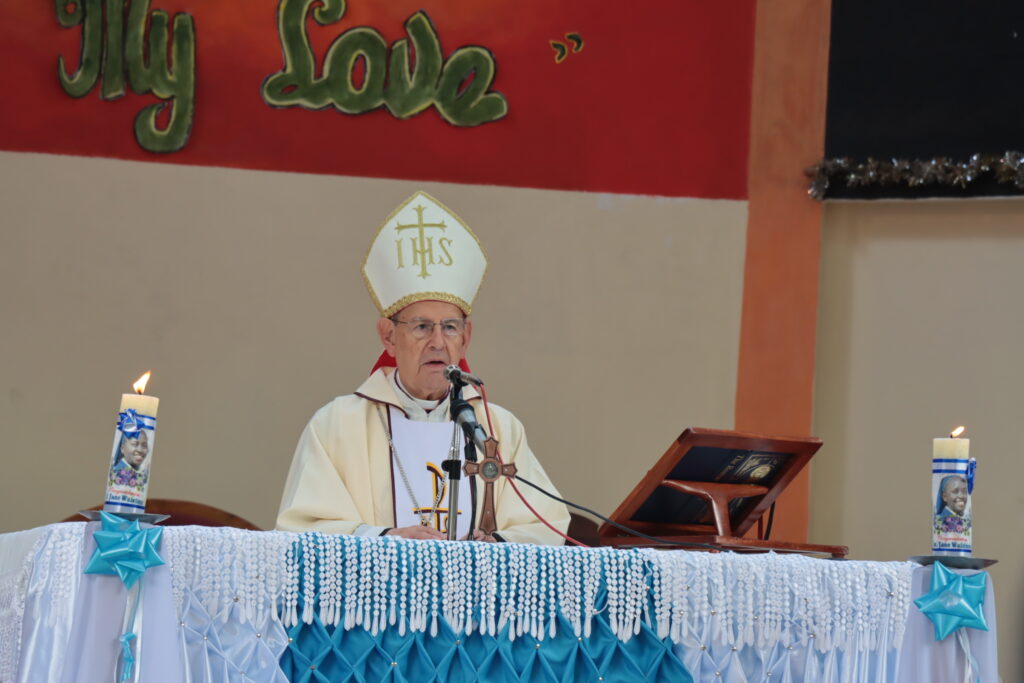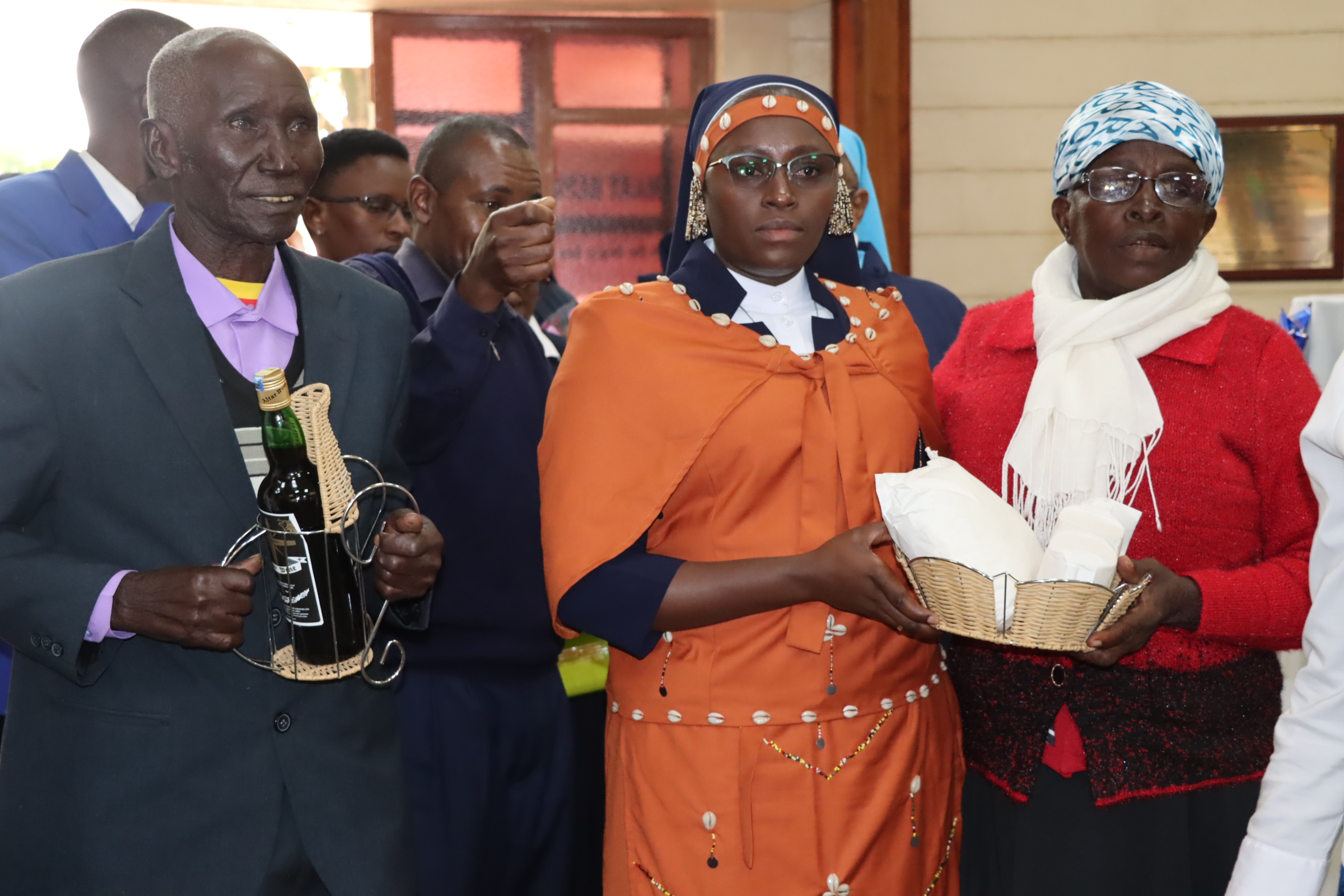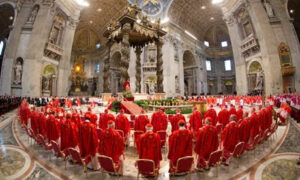KENYA: Religious Consecration Does Not Make One Super Christian: Prelate Cautions at Nun’s Perpetual Profession

Bishop Rodrigo; Credit AMECEA Online
Sr. Jecinter Antoinette Okoth, FSSA
Religious men and women in the Catholic Church make commitment to God through the three evangelical counsels, a step which a Bishop has cautioned does not make them “super Christians.”
During the occasion of perpetual profession for a nun from the Congregation of Sisters of Mary Reparatrix (SMR) on May, Wednesday 31, on the feast of the visitation of the Virgin Mary, Bishop emeritus Rodrigo Mejía Saldarriaga appreciated the life of the Religious as a means through which the consecrated persons devote themselves to the service of God.
“The Religious consecration does not make a man or women a super Christian,” Bishop emeritus of Ethiopia’s Soddo Apostolic Vicariate said in his homily referencing Vatican II document that, “The religious vows are rooted in baptism, a teaching of the second Vatican council in Lumen Gentium.”
According to Bishop Rodrigo who is member of the Society of Jesus (Jesuits), when the Religious take baptism as the root of their three vows of obedience, poverty and chastity, it means “we receive Christian life made of three main virtues of faith, hope and love which link us to God and to other people.”
The Colombian-born Prelate expounded how the three theological virtues of faith hope and love are linked to the three evangelical counsels during the final profession of Sr. Jane Wairimu Gatungu from Immaculate conception Kilimambogo Parish in the Archdiocese of Nairobi.
“Faith is rooted in the rule of our obedience,” Bishop Rodrigo said addressing the congregants just before Sr. Wairimu took her perpetual profession.
“In religious life the vow of obedience is not taken for the purpose of better organization or better efficacy. Even though it is true that obedience makes our institutions be run correctly, obedience is practical and is required in any institution including commercial institution because failure to follow rules and guidance in any commercial institution, one is fired,” he continued.

He warned that the motivation of religious obedience is not for the proper running of the institutions but that “we obey because we believe that the will of God for us and the mission entrusted to us through the superiors is an extension of the will of God.”
“We see in the superior the incarnation of the will of God despite the limitations and weaknesses of a human superior. We know through faith that the superiors guide us to God’s will because as we say God writes straight even with crooked lines,” the Bishop said and narrated further, “That is why the sacrifice of obedience is a sacrifice of faith and without faith obedience is humanly impossible.”
The former Local Ordinary of Apostolic Vicariate of Soddo told the congregants majority of whom religious and clergy that the virtue of hope is the root of poverty which Christ taught his followers on the cross.
“Since the poverty which Jesus preached when talking about beatitudes (Mathew 5: 3-12) is not financial poverty but poverty in spirit which calls us to put our hope, our assurance and our security only in God and all the rest will follow, this radical hope in God is the characteristic of being poor in spirit, the Jesuit Bishop said.
He continued, “Jesus was poor. When in Nazareth, he was a carpenter and that means he was not a millionaire hence the poverty we are talking about here is Jesus at the top of the cross where he pronounced his solemn vow of poverty when he said, “Father into your hands I commend my spirit.”
Therefore, to trust in God as Bishop emeritus highlights is not to look for human assurances, not to put our hope on money or power or corruption since “religious life is full of risks and unexpected things,” but “to attach ourselves only to the kingdom of God because as the scripture has it, “Where your treasure is, there will your heart be also.”

Talking of how the virtue of love is the root of chastity the Prelate underscored that “It may seem a paradox in the eyes of the world that consecrated people renounce marriage,” but no “the sacrament of marriage is the sacrament of love oriented to form a family. It requires faithfulness with one another: the spouses and the children.”
But when we renounce marriage he said, “We are not renouncing the sin not at all. This love we are called to orient it to the people without any discrimination like race, age, color or nation but to love all as Jesus loved us.”
He therefore underscored that Religious do not just take vow of celibacy for the sake of it but it is a serious responsibility especially urging the religious to love those who are less loved in the society including the marginalized and the poor.
In his reflection in relation to the feast of the visitation of the Virgin Mary, Bishop Rodrigo stressed how the mother of Christ showed her commitment of faith, hope and love even if little is written on the scriptures of what she said.
“Faith was cleared recognized by her cousin Elizabeth,” the Bishop said and narrated, “When greeting Mary, Elizabeth said, happy are you who believe that what the Lord has told you will be accomplished.”
As a model of hope the Prelate said Mary never looked for help from outside but “The hope of Mary was pronounced in the annunciation when she said: “be it done to me according to your word.”
At the same time, he explained during the homily, “the love of Mary is centered in the will of God. We realize this during the wedding feast at Cana in Galilee when she exclaimed, “Do whatever he tells you,” this is love in action not just in words.”
In conclusion Bishop Rodrigo called the people of God rejoice for the generosity of God to Sr. Wairimu. “As we give thanks to God for that grace we pray that he who called her (Sr. Wairimu) will assist her in her life until the end of life.”
The Prelate noted that the perpetual profession is not to celebrate the achievements of the Kenyan nun, but the achievement of the grace of God in her.


